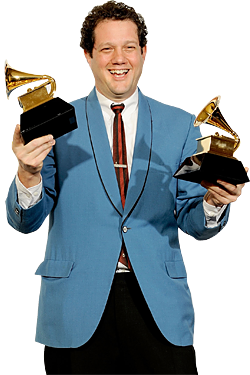
ItÔÇÖs practically impossible to imagine Lost without one of its most important characters: the music. Michael GiacchinoÔÇÖs score ÔÇö one moment fraught with tension, the next lyrically placid, and always generally creepy ÔÇö is often just as responsible for the showÔÇÖs mix of suspense, mystery, and romance as the writing. Giacchino came to Lost after a decade of film-scoring success, writing for both blockbuster movies and television, and heÔÇÖs nominated for a second Oscar for his whimsical score for Up. Giacchino spoke to Vulture from California, on the eve of another Lost recording session, about his place in the island universe, the secrets of writing good suspense music, and what exactly film-score nominees do before the Oscars.
How did you get started on Lost?
I became a part of the show because of J.J. Abrams, who IÔÇÖd worked with on Alias for all the years preceding Lost. After seeing the first episode ÔÇö which was the first and only episode I watched in its entirety before writing music ÔÇö I loved the pilot so much, I was like, ÔÇ£Wow, this is really weird. This is a show IÔÇÖd actually enjoy watching.ÔÇØ So going forward, IÔÇÖd refuse to read any scripts and just watch the edited episode. Whenever I felt there should be music, IÔÇÖd just start writing. To this day, itÔÇÖs how I do it ÔÇö scene by scene.
Do the writers give you any clue about what to expect from an episode?
Nope. And when they try to, I tell them to stop! Every once in awhile, they try to tell me, Somethings going to happen and we want you to just pay attention to this one scene   and its become this kind of bizarre conversation we have  we just had one today, in fact. They wanted me to watch for something in the next episode, and Im like, Im not going to watch it, you know that!
YouÔÇÖve come up with quite a few musical motifs that can be repeated week to week. WhatÔÇÖs the balance between original and repeated music in the episodes?
It depends on the story. When something new is introduced, whether itÔÇÖs a person or thing or place, thatÔÇÖs when I feel I have to do something new. IÔÇÖve been tracking each character with their own themes for the past six seasons, and those have stayed with them throughout. Now, with the Flash Sideways, everything is starting to splinter off. ItÔÇÖs probably been the most difficult season to score; in one episode, I may have two or three versions of Locke IÔÇÖm dealing with. ItÔÇÖs been tricky to track all that.
Do you have a favorite character to write for?
LockeÔÇÖs definitely a favorite. I love to write for Kate, as well; thereÔÇÖs something very Alfred Hitchcock about that character. For a composer, the showÔÇÖs like going to a candy store. They allow me to do whatever I want, and I write some really bizarre music you wouldnÔÇÖt normally hear on a television show.
ItÔÇÖs a fine line between suspense music that veers into caricature and music that just enhances whatÔÇÖs already there. Do you try to avoid specific things as youÔÇÖre writing?
Absolutely. In the very beginning of the show, there was this talk of, ÔÇ£We should have jungle flutes, and jungle rhythms all the time, ÔÇÿcause theyÔÇÖre in the jungle!ÔÇØ And I was like, this show is not about that ÔÇö itÔÇÖs about making you feel uncomfortable, so the music should create an ensemble you donÔÇÖt usually hear.
One of the great instrumental moments is the loud, alarm-ish trombone blasts. HowÔÇÖd you come up with those?
With some things, you try them out just to see whatÔÇÖll happen. Everyone laughs at first, but then after several episodes it just becomes a part of the show. In the case of the trombones, I remember one of the producers, Brian Burke, would say, ÔÇ£Stop doing that with the trombones! ItÔÇÖs weird!ÔÇØ IÔÇÖm like, thatÔÇÖs the point!
Were you working on Up at the same time as Lost?
Well , there was a time when I was working on Land of the Lost, Star Trek, Up, Lost, and a documentary called Earth Days all at the same time. It was the busiest time IÔÇÖve ever had, and so itÔÇÖs all about organization and scheduling. It was somewhat of a nightmare, but if I concentrate on the story and the characters for each, IÔÇÖm in good shape.
You certainly wrote a memorable theme for Up. What did you have in mind?
Pete Docter, the director, mentioned that he hoped there would be something nostalgic about it. For me, it all came out of that four-minute married-life sequence. Believe me, I cried working on it. That scene set the template for the entire film; if we didnÔÇÖt get that right, by the time you got to the end with dogs flying airplanes, you wouldnÔÇÖt buy it. ItÔÇÖs a perfect lesson in storytelling. The people at Pixar are amongst the best in the world at doing that.
What do film-score nominees do before the Oscars? Do you get to just kinda sit back and hang?
No, no, itÔÇÖs been exhausting actually. ThereÔÇÖs something every weekend; for something like Up, itÔÇÖs been nominated on so many fronts, so one weekend itÔÇÖs the Grammys, then the Golden Globes, the Critics Choice, then the BAFTAs in London. ItÔÇÖs all fun, but itÔÇÖs tiring. And then on top of it youÔÇÖre trying to work as well. I did just take a commission from the Dallas Symphony, so I think I owe them 30 to 40 minutes of music in 2011 or something. Oh my God. I have no idea what IÔÇÖm going to do!

